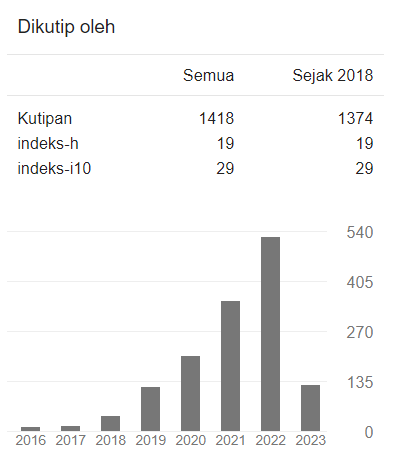HUBUNGAN POLA ASUH ORANG TUA DAN KECERDASAN INTERPERSONAL DENGAN PENGUASAAN KOMPETENSI PENGETAHUAN IPS SISWA KELAS IV
DOI:
https://doi.org/10.22219/jp2sd.v7i2.8937Keywords:
Interpersonal Intelligence, Mastery Of Social Science Competency, ParentingAbstract
This study aims to determine: (1) a positive and significant relationship between parenting and interpersonal intelligence with mastery of social science competency, (2) a positive and significant relationship between interpersonal intelligence and mastery of social science competency (3) positive and significant relationships jointly parenting parents and interpersonal intelligence with mastery of IPS knowledge competencies. This research is an ex post facto research type of correlation research. The population is 220 fourth grade students at SD Gugus XI Buleleng Subdistrict in 2018/2019 academic year. A sample of 135 students was determined by proportional random sampling method. Hypothesis testing uses simple regression test and multiple regression test. Based on the results of the hypothesis test showed: (1) a positive and significant relationship between parenting style and mastery of social science competency with a correlation of 0.621 (2) a positive and significant relationship between interspersonal intelligence and mastery of social science competency with a correlation of 0.689 (3) positive and significant relationship of parenting and interpersonal intelligence with mastery of social science competency with a correlation of 0.786. This means parents' parenting and interpersonal intelligence affect the mastery of the IPS knowledge competency of grade IV students in SD Gugus XI, Buleleng Subdistrict, 2018/2019 Academic Year.
Downloads
References
Agung, A.A. G. 2014. Buku Ajar Metodologi Penelitian Pendidikan. Yogyakarta: Aditya Media Publishing.
Apriyanti, M. E. 2016. “Hubungan Motivasi Belajar Dan Kecerdasan Interpersonal Terhadap Prestasi Belajar Ilmu Pengetahuan Sosial Sekolah Menengah Kejuruan Swasta”. Faktor Jurnal Ilmiah Kependidikan. Volume 3, Nomor 3 (hlm.289-296).
Budiarnawan, K. A, dkk. 2014. “Hubungan Antara Konsep Diri Dan Pola Asuh Orang Tua Terhadap Hasil Belajar IPA Siswa Kelas V SD di Desa Selat”. MIMBAR PGSD Undiksha, Volume 2, Nomor 1 (hlm.1-10).
Budang, P, dkk. 2017. “Korelasi Pola Asuh Orangtua Dengan Hasil Belajar Matematika Pada Siswa Kelas Iv Sd Negeri 5 Tengadak”. Jurnal Pendidikan Dasar Perkhasa. Volume 3, Nomor 2 (hlm.349-356).
Darsono dan Widya K. 2017. Sumber Belajar Penunjang Plpg 2017 Kompetensi Profesional Mata Pelajaran : Guru Kelas SD Unit IV : Ilmu Pengetahuan Sosial. Tersedia pada: https://www.usd.ac.id/fakultas/pendidikan/f1l3/PLPG2017/Download/materi/SD/ILMU-PENGETAHUAN-SOSIAL.pdf (diakses pada tanggal 4 Januari 2019).
Hakim, A. R. 2018. “Kecerdasan Interpersonal Siswa Melalui Model Student Teams Achievement Divisions”. ELSE (Elementary School Education Journal)”. Jurnal Pendidikan dan Pembelajaran Sekolah Dasar. Volume 2, Nomor 1 (hlm.51-58).
Machali, I. 2014. “Dimensi Kecerdasan Majemuk Dalam Kurikulum 2013”. Insania, Volume 19, Nomor 1 (hlm. 21-45).
Ningrum, W.R. 2016. “Pengaruh Peranan Dan Pola Asuh Orang Tua Terhadap Hasil Belajar Siswa Sekolah Dasar Negeri (SDN) Di Kecamatan Bogor Barat”. Jurnal Pendidikan, Volume 17, Nomor 2 (hlm.129-137).
Nurelah, E. 2016. ”Kemandirian Belajar Dan Kecerdasan Interpersonal Dengan Hasil Belajar IPS Peserta Didik Kelas V Sdn Di Wilayah Binaan IV Pulogadung Jakarta Timur”. Jurnal Pendidikan Dasar. Volume 7, Nomor 1 (hml.13-26).
Pratama, I. G. K, dkk. 2014. “Kontribusi Intensitas Hubungan Dalam Pola Asuh Orang Tua Dan Kecerdasan Emosional Terhadap Kecenderungan Perilaku Menyimpang”. Jurnal Ilmiah Bimbingan Konseling Undiksha.Volume: 2 No 1, Tahun 2014 (hlm.1-10).
Priyanti, N. L. S, dkk. 2017. “Pengaruh Keterampilan Dasar Literasi Berbantuan Media Grafis Terhadap Penguasaan Kompetensi Pengetahuan Ips Siswa Kelas IV SD”. Journal of Education Technology, Volume 1, Nomor 2 (hlm. 110-116).
Rustandi, E. 2017. “Hubungan Pola Asuh Orang Tua Dan Kedisiplinan Dengan Hasil Belajar Penjas Siswa Kelas VI SDN Sukasari Tahun Ajaran 2014/2015”. Jurnal Educatio FKIP UNMA. Volume 3, Nomor 1 (hlm.10-17)
Rochmawati, P dan Mufidatul A. 2018. “Korelasi Kecerdasan Interpersonal, Intrapersonal Dan Kecerdasan Emosi Siswa Kelas V SD Muhammadiyah Ponorogo”. Muslim Haritage.Volume 3, Nomor 2 (hlm. 239-259).
Rofiah, N. H. 2016. “Menerapkan Multiple Intelligences Dalam Pembelajaran di Sekolah Dasar” . Jurnal Dinamika Pendidikan Dasar. Volume 8, Nomor 1 (hlm.68 – 79).
Salo, E. S, dkk. 2019. “Pengaruh Perhatian Orangtua dan Minat Belajar Terhadap Prestasi Belajar IPS Siswa di SDN 3 Toraja Utara Kabupaten Toraja Utara”. Elementary Journal. Volume 1, Nomor 2 (hlm.1-11).
Saputra, I Dw. Kt.Artha, dkk. 2018. Korelasi Antara Kecerdasan Interpersonal Dengan Hasil Belajar IPS Siswa Kelas V Di SD Gugus IV Abiansemal Tahun Pelajaran 2017/2018. Indonesian Journal of Educational Research and Review. Volume 1, Nomor 1 (hlm.11-20).
Sardjiyo,dkk. 2014. Pendidikan IPS SD. Banten: Universitas Terbuka.
Siringoringo, S. N. 2018. “Hubungan Pola Asuh Orang Tua Terhadap Kecerdasan Emosi Siswa. JURKESSUTRA (Jurnal Kesehatan Surya Nusantara). Volume 6, Nomor 22 (hlm. 35-44).
Sujiono, Yuliani Nurani. 2009. Konsep Dasar Pendidikan Anak Usia Dini. Jakarta: Indeks.
Sukardi. 2008. Metodologi Penelitian Pendidikan. Jakarta: PT Bumi Aksara.
Sumarliani, K. R, dkk. 2017. “Pengaruh Model Pembelajaran Kooperatif Tipe Snowball Throwing Bermediakan Gambar Terhadap Hasil Belajar IPS Siswa Kelas IV SD di Gugus I Kecamatan Buleleng Kabupaten Buleleng. E-Journal PGSD Universitas Pendidikan Ganesha Mimbar PGSD. Volume 5, Nomor 3 (hlm1-12).
Surna, I Nyoman dan Olga D. P. 2014. Psikologi Pendidikan 1. Jakarta: Penerbit Erlangga.
Susanto, A. 2015. Bimbingan dan Konseling di Taman Kanak- Kanak. Jakarta: Prenadamedia Group.
Wahyudi, S. T. 2017. Statistika Ekonomi Konsep, Teori dan Penerapan. Malang: UB Press.
Wibawa, I. B, dkk. 2018. “Pengaruh Model Pembelajaran Make A Match Berbantuan Media Audio Visual Terhadap Kompetensi Pengetahuan IPS”. Jurnal Ilmiah Sekolah Dasar, Volume 2, Nomor 1 (hlm. 36-143).
Yusuf, M. 2016. Metode Penelitian Kuantitatif, Kualitatif & Penelitian Gabungan. Jakarta: Prenamedia Group.
Downloads
Published
Issue
Section
License
Authors who publish with Jurnal Pemikiran dan Pengembangan Sekolah Dasar (JP2SD) agree to the following terms:
- For all articles published in Jurnal Pemikiran dan Pengembangan Sekolah Dasar (JP2SD), copyright is retained by the authors. Authors give permission to the publisher to announce the work with conditions. When the manuscript is accepted for publication, the authors agree to automatic transfer of the publishing right to the publisher.
- Authors retain copyright and grant the journal right of first publication with the work simultaneously licensed under a Creative Commons Attribution-ShareAlike 4.0 International License that allows others to share the work with an acknowledgment of the work's authorship and initial publication in this journal.
- Authors are able to enter into separate, additional contractual arrangements for the non-exclusive distribution of the journal's published version of the work (e.g., post it to an institutional repository or publish it in a book), with an acknowledgment of its initial publication in this journal.
- Authors are permitted and encouraged to post their work online (e.g., in institutional repositories or on their website) prior to and during the submission process, as it can lead to productive exchanges, as well as earlier and greater citation of published work (See The Effect of Open Access).

This work is licensed under a Creative Commons Attribution-ShareAlike 4.0 International License.


















